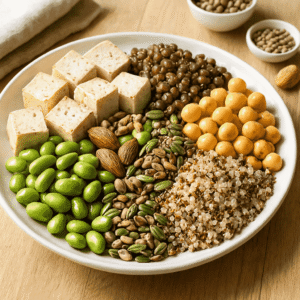Aging is a natural part of life, but with it comes certain challenges one of them being muscle loss. As we age, our bodies undergo changes that can lead to a gradual reduction in muscle mass, making daily activities more difficult and increasing the risk of falls and injuries. However, the good news is that there are ways to combat this and maintain muscle strength as we grow older. In this blog post, we’ll explore how to prevent muscle loss as you age, focusing on key lifestyle adjustments, including nutrition, exercise, and wellness habits for healthy aging.
What is Muscle Loss in Aging?
Muscle loss, also known as sarcopenia, is a condition where people experience a decline in muscle mass and strength as they age. This typically begins around the age of 30 and progresses more rapidly after the age of 60. If not addressed, sarcopenia can affect mobility and quality of life.
Active Ageing Week and Healthy Aging Month emphasize the importance of maintaining physical activity and muscle health to age gracefully and stay strong throughout life. Let’s dive into some strategies that can help you prevent muscle loss as you age.
1. Stay Active: Regular Exercise
One of the most effective ways to prevent muscle loss is by staying physically active. Engaging in regular resistance and strength training exercises helps build and preserve muscle mass.
Types of exercises to include:
- Strength Training: Lifting weights, using resistance bands, or bodyweight exercises like squats and push-ups can build and maintain muscle strength. Strength training is key for preventing sarcopenia.
- Cardio Exercises: Activities like walking, swimming, and cycling help keep your heart healthy and improve overall endurance, which also supports healthy muscles.
- Flexibility and Balance: Yoga and stretching improve flexibility and balance, reducing the risk of falls.
For a detailed guide on how to incorporate exercise into your daily routine, check out Exercise & Workouts.
2. Focus on Your Diet: Protein and Nutrient-Rich Foods for healthy aging
A well-balanced diet plays a significant role in maintaining muscle mass as you age. Protein is essential for muscle repair and growth, so be sure to consume enough protein-rich foods.
Key nutrients for healthy aging:
- Protein: Include lean meats, fish, eggs, dairy products, legumes, and nuts in your diet.
- Omega-3 Fatty Acids: Found in fish like salmon, these help reduce inflammation and promote muscle protein synthesis.
- Calcium and Vitamin D: These are important for bone health, which supports overall mobility and muscle function.
- Antioxidants: Fruits and vegetables rich in antioxidants help reduce muscle damage caused by aging.
If you need more information on maintaining a balanced diet, you can read more at Nutrition & Diet.
3. Stay Hydrated is important for healthy aging
Water is often overlooked but is essential for maintaining healthy muscles. Dehydration can lead to muscle cramps and decrease your muscle performance, especially during exercise. Drink plenty of water throughout the day, especially when working out.
4. Get Enough Rest
Rest is just as important as exercise for muscle preservation. As you age, your body needs sufficient time to recover. Sleep allows muscles to repair themselves after workouts and helps prevent muscle breakdown.
Experts recommend aiming for 7-9 hours of quality sleep every night. To learn more about maintaining good mental and physical health through adequate rest, explore Mental Health & Wellness.
5. Supplement Smartly
As part of a diet for healthy aging, supplements can provide additional support for muscle maintenance. Here are some that may help:
- Protein Supplements: Whey protein, casein, or plant-based protein powders can help you meet your daily protein needs, especially if you’re not getting enough from food sources.
- Creatine: This supplement has been shown to increase muscle strength and mass, particularly in older adults.
- Vitamin D: If you’re not getting enough sunlight or your diet is lacking, Vitamin D supplements can help with muscle function.
Always consult with a healthcare provider before starting any supplement regimen.
6. Stay Mentally Active
Maintaining mental health is also crucial for overall wellness. A positive outlook and stress management can influence physical health, including muscle preservation. Chronic stress can elevate cortisol levels, which may lead to muscle breakdown. Incorporating mindfulness, meditation, or stress-relief activities can help keep your body and mind healthy.
Find more tips on mental well-being at Mental Health & Wellness.
7. The Importance of Regular Health Check-ups
Regular check-ups with your healthcare provider can help monitor your muscle health and detect any issues early. Blood tests, bone density scans, and muscle mass assessments can provide insight into your overall physical condition, ensuring you take the right steps to prevent muscle loss.
Conclusion: Embrace Healthy Aging
Aging doesn’t have to mean losing strength or muscle mass. By staying active, eating a balanced diet, and maintaining good physical and mental health, you can prevent muscle loss and enjoy a higher quality of life as you age.




